
The Diogenes Club
The Diogenes Club is a fictional gentleman's club created by Sir Arthur Conan Doyle and featured in several Sherlock Holmes stories, most notably "The Greek Interpreter". It seems to have been named after Diogenes the Cynic (although this is never expanded upon in the original stories) and was co-founded by Sherlock's indolent older brother, Mycroft Holmes.
The section reads as follows:
There are many men in London, you know, who, some from shyness, some from misanthropy, have no wish for the company of their fellows. Yet they are not averse to comfortable chairs and the latest periodicals. It is for the convenience of these that the Diogenes Club was started, and it now contains the most unsociable and unclubable men in town. No member is permitted to take the least notice of any other one. Save in the Stranger's Room, no talking is, under any circumstances, allowed, and three offences, if brought to the notice of the committee, render the talker liable to expulsion. My brother was one of the founders, and I have myself found it a very soothing atmosphere. – The Greek Interpreter
Diogenes "the Cynic", Greek philosopher, was born in Sinope (modern day Sinop, Turkey) about 412 BC (according to other sources 404 BC), and died in 323 BC, at Corinth. Diogenes, a beggar who made his home in the streets of Athens, made a virtue of extreme poverty. He is said to have lived in a large tub, rather than a house.

One could describe Diogenes as a bit of a performance artist:
He used to stroll about in full daylight with a lamp; when asked what he was doing, he would answer, "I am just looking for a human being."

When Plato gave Socrates' definition of man as "featherless bipeds" and was much praised for the definition, Diogenes plucked a chicken and brought it into Plato's Academy, saying, "Behold! I've brought you a man." After this incident, "with broad flat nails" was added to Plato's definition.
Alexander found the philosopher looking attentively at a pile of human bones. Diogenes explained, "I am searching for the bones of your father but cannot distinguish them from those of a slave."
Diogenes seems to have led quite a solitary life, thinking, begging and working on ways to make his life ever more simple.

The Zone
Stalker is a 1979 science fiction film directed by Andrei Tarkovsky, and loosely based on the novel Roadside Picnic by Boris and Arkady Strugatsky. It depicts an expedition led by the Stalker (guide) Alexander Kaidanovsky to bring his two clients, the Writer and the Professor, to a site known as "the Zone", which has the supposed potential to fulfill a person's innermost desires.
In an interview on the MK2 DVD, production designer Rashit Safiullin, describes the Zone as a space in which humans can live without the trappings of society, and can speak about the most important things freely. (Wikipedia.org)
Thinking space
The interesting thing about these two variations on a thinking space is the idea of personal fulfillment that can only be achieved by a level of isolation and peace. The difficult part is escaping the trappings of society. In the Diogenes Club this is achieved by setting up a restricted space, a club, and imposing rules of silence. The Zone is only found after running the gamut of military machine gun fire and following the directions of the Stalker. The idea of a thinking space has a lot of significance today with the all-pervading sounds of television and pop radio in every public space, even in banks which in the past were as hallowed as churches.
Not that personal fulfillment is necessarily a selfish idea in relation to society in general. Even Karl Marx had to go the British Library for some peace and quiet to work out his ideas for Kapital. There are many distractions in the world today and having a space to work in without the constant ringing of the phone or the doorbell is a difficult achievement. However, by ignoring the phone and taking the batteries out of the doorbell one can enjoy a certain level of peace and quiet to get down to some real work. It can take some time to calm down and concentrate on the job in hand. One reason for this is that painting, like writing or composing is an intensely intellectual process. Artists are so often portrayed as over-emotional beings who are like wild animals splashing and throwing paint on enormous canvases and mystically ingesting the results before getting into another rage and attacking the canvas with another implement like a roller to achieve the perfect visual representation of their own personal catharsis. (See Woody Allen’s film Vicky Cristina Barcelona for an excellent example)
However, while a certain amount of painting involves dynamic bodily exertions, much of the work consists of imagining what one wants the finished work to look like and then setting out to achieve that through tone, composition and choice of colour. And this is where the concentration comes in, the importance of peace and quiet to think about which colour or tone is more suitable for different sections of the work in progress. Will there be an overall flattening of the tones or will there be depth? Will I emphasise some elements of the design to bring them forward or send them back? Will I break down and abstract some of the elements or keep a level of realism? What am I trying to achieve with the symbols I have chosen to use? How do I use line and brushstroke to retain a level of dynamism without deadening the whole movement of the composition? Eventually the picture starts to take shape and it becomes easier to see where it is going and push it along to its final destination. Having said that, knowing when to stop is of extreme importance too otherwise the fine balance of looking dynamic or muddy is upset.
Philip Guston described the process thus:
Usually I am on a work for a long stretch, until a moment arrives when the air of the arbitrary vanishes, and the paint falls into positions that feel destined.
By giving ourselves the time and space to think out our ideas we achieve a level of self-fulfillment while at the same time allowing us to go back out into society with renewed desire for debate and action in society itself.
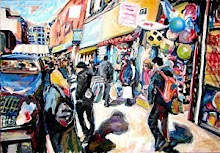

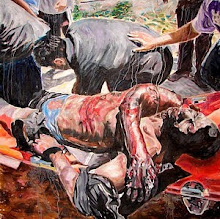
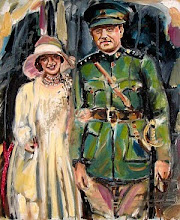






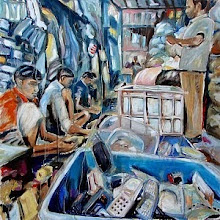

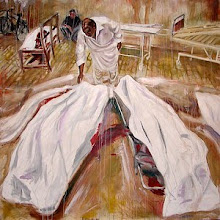

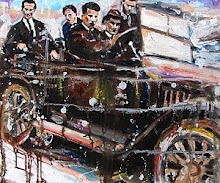
No comments:
Post a Comment